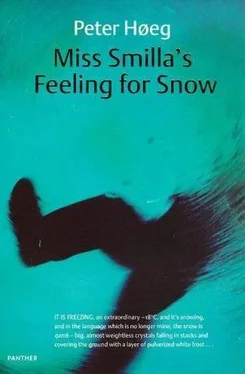Peter Høeg - Smilla's Sense of Snow aka Miss Smilla's Feeling for Snow
Здесь есть возможность читать онлайн «Peter Høeg - Smilla's Sense of Snow aka Miss Smilla's Feeling for Snow» весь текст электронной книги совершенно бесплатно (целиком полную версию без сокращений). В некоторых случаях можно слушать аудио, скачать через торрент в формате fb2 и присутствует краткое содержание. Жанр: Современная проза, на английском языке. Описание произведения, (предисловие) а так же отзывы посетителей доступны на портале библиотеки ЛибКат.
- Название:Smilla's Sense of Snow aka Miss Smilla's Feeling for Snow
- Автор:
- Жанр:
- Год:неизвестен
- ISBN:нет данных
- Рейтинг книги:3 / 5. Голосов: 1
-
Избранное:Добавить в избранное
- Отзывы:
-
Ваша оценка:
- 60
- 1
- 2
- 3
- 4
- 5
Smilla's Sense of Snow aka Miss Smilla's Feeling for Snow: краткое содержание, описание и аннотация
Предлагаем к чтению аннотацию, описание, краткое содержание или предисловие (зависит от того, что написал сам автор книги «Smilla's Sense of Snow aka Miss Smilla's Feeling for Snow»). Если вы не нашли необходимую информацию о книге — напишите в комментариях, мы постараемся отыскать её.
Smilla's Sense of Snow aka Miss Smilla's Feeling for Snow — читать онлайн бесплатно полную книгу (весь текст) целиком
Ниже представлен текст книги, разбитый по страницам. Система сохранения места последней прочитанной страницы, позволяет с удобством читать онлайн бесплатно книгу «Smilla's Sense of Snow aka Miss Smilla's Feeling for Snow», без необходимости каждый раз заново искать на чём Вы остановились. Поставьте закладку, и сможете в любой момент перейти на страницу, на которой закончили чтение.
Интервал:
Закладка:
"Imagine their situation in '66-Loyen, Ving, and Licht. Everything has been planned. There are problems, of course, but they're mere technicalities and solvable. They've pinpointed the stone, constructed the entryway and these rooms; the weather is good, and they have plenty of time, relatively speaking. They realize that they can't bring the whole stone back, but they know they can take home a piece of it. There are photographs of their saws, a brilliant invention, a hardened steel band that ran across rollers. Loyen was opposed to cutting the stone with blowtorches. Then just as the Inuits are putting the saw in position, they die. Forty-eight hours after their first dive. They die almost simultaneously, within an hour of each other. Everything changes. The project has failed and time is running out. They have to improvise an accident. Loyen is the one who does it, of course. He has enough presence of mind not to destroy the bodies. At that point he already has a feeling that something is wrong. As soon as they reach Nuuk he does an autopsy. And what does he find?"
"Look at the time," says Verlaine.
Tørk ignores him. "He finds the Arctic worm. A widespread parasite. Big, twelve to sixteen inches long, but quite ordinary. A roundworm whose cycle is known and understood. There's only one thing wrong: it's not found in human beings. In whales, in seals, and dolphins, and occasionally in walruses. But not in human beings. Nearly every day infected meat is eaten, especially by Inuits. But the moment the larva enters the human body, it's recognized by our immune system as a foreign object and is devoured by lymphocytes. It has never adapted to our immune system. It has always been limited to certain large sea mammals with which it must have developed simultaneously. It's part of the balance of nature. Imagine Loyen's astonishment when he finds it in the corpses. And quite by accident, too. Because at the last minute he was forced to take X-rays to identify the bodies."
I don't want to listen to him or talk to him, but I can't help it. And besides, it stretches out the time.
"Why did it happen?"
"That's the question Loyen couldn't answer. So he concentrated on a different question: How did it happen? He had brought samples home from the water around the stone. Aside from the meltwater, the lake is fed by another lake higher up, on the surface. There's some bird life up there. And quite a lot of trout. And several kinds of fleas. The water around the stone is full of them. All of the samples Loyen brought home were infected. So he decided to graft the larva onto living human tissue."
"That sounds lovely," I say. "How did he manage to do that?"
As I ask the question, the answer comes to me. He did it in Greenland. In Denmark the chance of being discovered would be too great.
Tørk sees that I realize how it was done.
"It took him twenty-five years. But he found out that the larva had adapted to the human immune system. As soon as it's in the mouth it penetrates the open mucous membranes and forms a kind of skin, created from the person's own proteins. In this camouflage the parasite is mistaken for the human body itself and the defense system leaves it in peace. Then it starts to grow. Not slowly, over a period of months, the way it does in seals and whales, but rapidly, hour by hour and minute by minute. Even the mating and wandering through the body, which can take up to six months in a sea mammal, now take only a few days. But that's not the decisive factor."
Verlaine takes him by the arm. Tørk looks at him. Verlaine removes his hand.
"I want to ask her about something," says Tørk. Maybe that's what he believes, but that's not why he's talking. He's talking in order to win attention and recognition. Beneath his self-confidence and apparent objectivity there is a wild pride and triumph at what he has discovered. Both Verlaine and I are sweating and have started to cough. But he is cool and at ease; in the flickering light of the fire his face is utterly calm. Maybe it's because we're standing in the middle of the ice, maybe it's because it's so obvious that we're nearing the end, that he suddenly seems so transparent to me. As always when an adult becomes transparent, the child inside him steps forth. I remember Victor Halkenhvad's letter, and suddenly, irresistibly, the words spew out of my mouth of their own accord.
"Like the bicycle you never had when you were a child."
The remark is so absurd that at first he doesn't understand it. Then the meaning sinks in, and for a moment he staggers as if I'd hit him. He almost loses it, but then he pulls himself together.
"You might think we've discovered a new species. But that's not the case. It's the Arctic worm. But with a vital difference. It has adapted to the human immune system. But without adapting to our equilibrium. The pregnant female does not make its way to the subcutis after mating. It enters the internal organs, the heart and the liver. That's where it releases its larvae. The larvae that have been living inside the mother, that aren't familiar with the human body, that aren't covered with a protein skin. The body reacts to them with infection and inflammation. It goes into shock. There are 10 million larvae in a single release. Inside the vital organs. The person dies on the spot. There's no way to save him. No matter what else has happened to the Arctic worm, it has upset the balance. It has killed its host. It's a poor parasite, in terms of human beings. But an excellent killer."
Verlaine says something in a language that I don't understand. Tørk again ignores him.
"Verlaine grafted the larva onto all the fish we could get hold of: saltwater fish, freshwater fish, big ones and small ones, at varying temperatures. The parasite adapts to every single one. It can live anywhere. Do you know what that means?"
"That it's not fussy?"
"It means that one of the most important factors restricting its dispersal is lacking: the limitation of the hosts that are capable of transmitting it. It can live anywhere."
"Why hasn't it spread all over the world?"
He gathers up several coils of rope, picks up a bag, and dons a miner's lamp. His sense of time has returned. "There are two answers to that question. The first is that its development in sea mammals is slow. Even if the parasite from this lake and from other lakes on this island as well is washed out to sea, it has to sit and wait for some passing seals to carry it farther, if it's still alive when the seals come by. One answer is that there still haven't been enough people here. The development process doesn't pick up speed until there are human beings involved."
He leads the way. I know that I'm supposed to follow him. For a moment I hang back. As he leaves the room, I'm struck with a feeling of powerlessness. Verlaine looks at me.
"When we were working for Khum Na," he says, "twelve police officers arrived. The only one who escaped was a woman. Women are vermin."
"Ravn," I say. "Nathalie Ravn?"
He nods. "She came over as an English nurse. Spoke English and Thai without an accent. At that time we were at war with Laos, Cambodia, and, in the end, Burma too, with support from the U.S. There were many casualties."
He holds the petri dish between his thumb and forefinger and lifts it toward me. My body instinctively tries to shrink away from the worm. It must be sheer stubbornness that keeps me standing there.
"When it penetrates the skin, it pushes its womb out and emits a white fluid full of millions of larvae. I've seen it.
Disgust contorts his face.
"The females are much bigger than the males. They burrow into the flesh. We followed them with ultrasound scanners. Loyen had grafted them onto two Greenlanders who had AIDS. He had them flown to Denmark and admitted to one of the small private hospitals where they don't ask about anything except your account number. We could see everything-how it reached the heart and then emptied itself out. The womb and everything. All females are that way, even humans, especially humans." He carefully puts down the petri dish.
Читать дальшеИнтервал:
Закладка:
Похожие книги на «Smilla's Sense of Snow aka Miss Smilla's Feeling for Snow»
Представляем Вашему вниманию похожие книги на «Smilla's Sense of Snow aka Miss Smilla's Feeling for Snow» списком для выбора. Мы отобрали схожую по названию и смыслу литературу в надежде предоставить читателям больше вариантов отыскать новые, интересные, ещё непрочитанные произведения.
Обсуждение, отзывы о книге «Smilla's Sense of Snow aka Miss Smilla's Feeling for Snow» и просто собственные мнения читателей. Оставьте ваши комментарии, напишите, что Вы думаете о произведении, его смысле или главных героях. Укажите что конкретно понравилось, а что нет, и почему Вы так считаете.




![Рута Шепетис - Ashes in the Snow [aka Between Shades of Gray]](/books/414915/ruta-shepetis-ashes-in-the-snow-aka-between-shades-thumb.webp)







